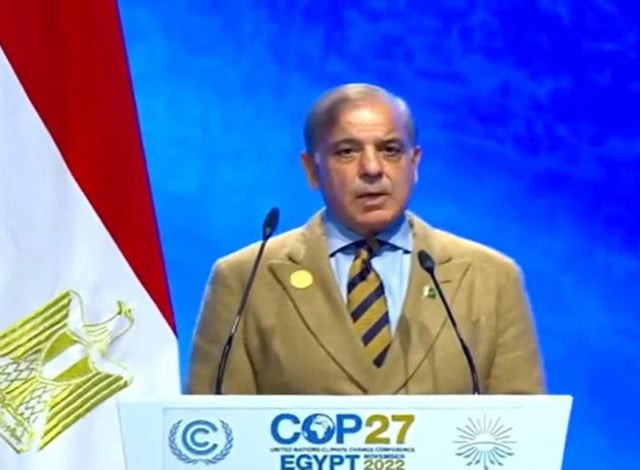We need funds, not debts: Shehbaz
PM reminds world plight of flood-hit Pakistan

Prime Minister Shehbaz Sharif, sensitising the international community on the plight of flood-hit Pakistan, on Tuesday said the country needed additional funding, not debts, to rebuild a resilient and adaptive infrastructure as the financing gap was widening by the day.
“We have to fight and rebuild a resilient and adaptive infrastructure which can only be done through additional funding, not loans and debt… but the gap is widening by the day. It is the duty of the global north to understand our plight,” the prime minister said in his National Statement at the COP27 summit held in Egypt’s Sharm El Sheikh.
He told the international gathering that climate change-induced catastrophic flooding in Pakistan had impacted 33 million people – the size of three European countries – with more than half being women and children.
He said that the floods had destroyed over 8,000 kilometres of highways, damaged more than 3,000 kilometers of railway tracks and washed away crops over four million acres.
The Post-Disaster Needs Assessment estimates over US$30 billion in loss and damage, he added.
He said Pakistan suffered the manmade disaster despite less than one per cent contribution to the global carbon footprint.
The premier told the gathering that the flood-hit Pakistan had to import wheat, palm oil, and “very expensive” oil and gas spending around $32 billion.He said the country had also redirected its resources to meet the basic needs of the millions of flood-affected households.
He said Pakistan was spending billions of dollars from its own resources to provide shelter, homes, medical aid, and food package to millions of people.
“How one can expect us to carry out this gigantic task on our own,” he questioned and thanked the international community for extending support to Pakistan for the relief of the flood survivors.
Highlighting Pakistan’s priorities, the prime minister emphasised prioritising the Global Goal on Adaptation both in terms of financing and timelines. The current financing gap is too high to sustain any real recovery needs of those on the frontlines of climate catastrophe, he added.
Secondly, he said the Loss and Damage needed to be part of the core agenda of COP27 to meet the pressing humanitarian needs of those who were trapped in a crisis of public financing fueled by debt and yet have to fund climate disasters on their own.
Thirdly, Prime Minister Shehbaz called for clearly defining climate finance as new, additional and sustained resources with a transparent mechanism to meet the needs of developing and vulnerable countries with the required speed and scale.
“We have been talking for years. But have failed to even agree on the basics. Pledges made at the Copenhagen COP 15 in 2009 for mobilising $100 billion per annum by 2020 have still not been realised. They need to be enhanced given the increased frequency and intensity of climate extreme events,” he urged.
He added that the bargain between the North and the South would not work unless there was a transformational shift in the flow of capacities, finances, and technology that reversed the pyramid of climate capital.
“The COP might have a real chance to find common ground toward achieving the objectives of the Convention and the Paris Agreement,” he stated, stressing that “it is now or never”.
“For us, there is indeed no Planet B,” PM Shehbaz concluded.
Meanwhile, Germany would double its funding for the protection of forests to €2 billion through 2025, mostly investing in countries such as Pakistan, Brazil, Ecuador, and Madagascar, the country’s development ministry said on Tuesday.
The announcement came a day after more than 25 countries, including Pakistan, formed a new group called ‘Forest and Climate Leaders’ Partnership’ at the COP27, which is under way in Red Sea resort of Sharm el-Sheikh in Egypt.
The new group – which also includes Japan, the Republic of Congo, the United Kingdom and others – accounts for roughly 35% of the world’s forests and aims to meet twice a year to track progress.
Speaking at the summit, German Chancellor Olaf Scholz said that Germany would up its investments in international environmental programmes, bringing the total to €6 billion.
Scholz also had a meeting with Prime Minister Shehbaz on the sidelines of COP27. They discussed matters related to trade, investment, climate change and renewable energy.
The two leaders also reviewed the bilateral relations and considered the possibilities of increasing cooperation. Regional and global issues of mutual interests were also discussed during the meeting.
Expressing his gratitude for the technical training support provided by Germany to Pakistan over the years, Shehbaz stressed the need for exchange of knowledge.
He was also appreciative of Germany's support to Pakistan for the grant of Generalised System of Preferences (GSP)-Plus status by the European Union.
He also thanked Germany for its assistance in the wake of recent floods.
The prime minister said that regardless of Pakistan's minimal contribution to the emission of greenhouse gases, the country was being severely impacted by natural disasters resulting from climate change.
Prime Minister Shehbaz emphasised that the COP27 should take bold decisions to deal with the issue of climate change, especially the damage and loss caused by it.
Chancellor Scholz evinced keen interest in Pakistan’s reconstruction and rehabilitation plans in the wake of the devastating floods, and assured the prime minister of Germany’s continued support.
Agencies



















COMMENTS
Comments are moderated and generally will be posted if they are on-topic and not abusive.
For more information, please see our Comments FAQ